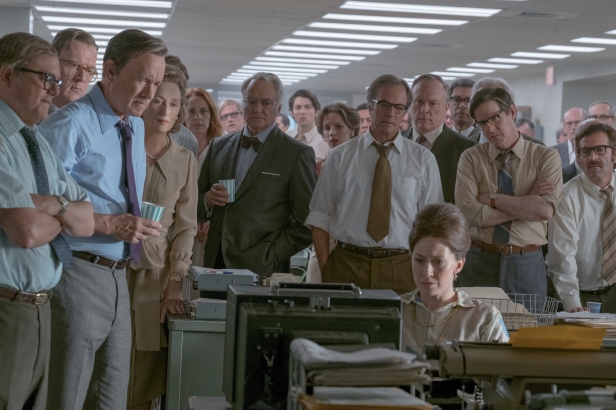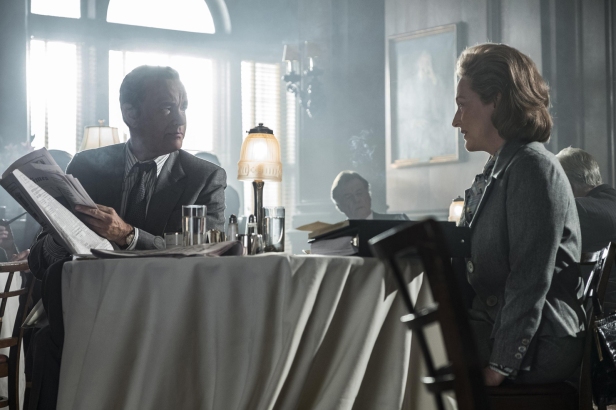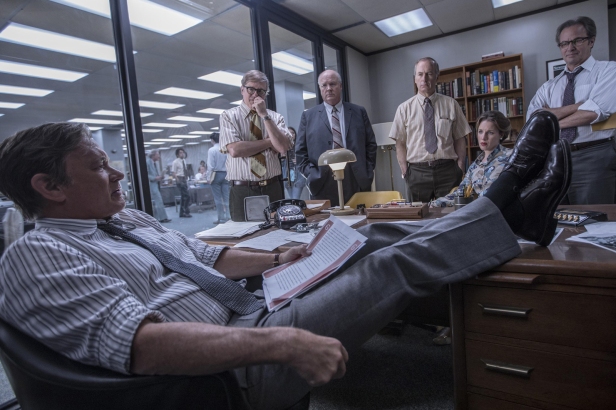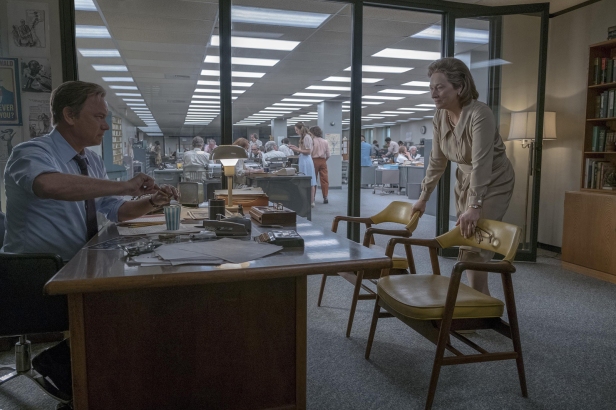The Post (2017)
The latest collaboration between Academy Award-winning moviemaker Steven Spielberg and two-time Oscar winner Tom Hanks, The Post, is the fifth time that the 61-year-old megastar has landed himself a lead role in a Spielberg-directed film, following Bridge of Spies (2015), The Terminal (2004), Catch Me If You Can (2002), and, before that, Saving Private Ryan (1998); though, the duo have worked together countless times before, on projects such as The Money Pit (1986), which was produced by Spielberg and starred a relatively unknown Hanks, while both served as executive producers on small-screen mini-series’ Band of Brothers (2001) — in which the pilot episode was written and directed by Hanks — and The Pacific (2010), both shows focusing on atrocities and hardships faced by soldiers who fought in World War II.

Their newest pairing is a gripping account that’s based on real-life events, chronicling how The Washington Post defied the Nixon administration, Hanks starring alongside the legendary Meryl Streep in the dramatization of the controversial Pentagon Papers incident, the (then) small-time newspaper risking it all by choosing to publish leaked government documents after an injunction made by the federal court (in the name of national security) barred competitor The New York Times from further exposing their long-buried secrets, the classified study detailing the full extent of America’s involvement in the Vietnam War, revealing how successive presidential administrations had lied to the American public and concealed the hard facts. Running at a brisk 116-mintues, The Post tells the in-house story of the Pentagon Papers from the vantage point of the titular Post. Sure, we get a glimpse of the bigger picture — the subsequent trial, concluding at the Supreme Court, and the civil liberty ‘First Amendment’ triumph that ensued — but really, it’s the behind-the-headlines conflict that fuels this yarn.
Set in the summer of 1971, taking place over a mere few weeks, The Post trails 46-year-old Katharine ‘Kay’ Graham (Meryl Streep), the first female publisher of The Washington Post (and first ever woman to head a major national news organization), and its motivated, tough-minded executive editor Ben Bradlee (Tom Hanks), as they scramble against the clock to catch up with their chief rival, The New York Times, our protagonists forced to overcome their personal differences when faced with a decision that could cost them their freedom, reputation and careers.

When disillusioned Pentagon analyst Daniel Ellsberg (Matthew Rhys) steals damning government secrets — a 7,000-page report now known as the Pentagon Papers — in the hope of stopping the feud in Vietnam, and members of Congress fail to listen, he quickly turns to the media for coverage, illustrious national newspaper The New York Times more than willing to print the truth. You see, this was an enormous cover-up that spanned three decades and a number of U.S. Presidencies (from Truman to Eisenhower, Kennedy to Johnson, and the then-in-power Richard Nixon), the Times’ exposé (which hit newsstands on Sunday June 13, 1971) shedding light on the raging hostilities taking place over in the East — as it stood, the Vietnam War was reportedly unwinnable, costing the nation some 58-thousand soldiers, the proud American government aware of their prospective loss (since the mid-1960s), yet choosing to send in troops all the same.
When the Times are legally banned from printing more of the papers, whistle-blower Ellsberg is speedily recruited by ‘local’ underdog The Washington Post by one of his former employees, assistant managing editor Ben Bagdikian (Bob Odenkirk), who immediately takes the documents to the commander of the newsroom, Hanks’ Bradlee. Afraid of the legal ramifications of running the story — charges that include treason and prison time — Bradlee turns to his superior, inexperienced publisher Kay, who’s then faced with a moral dilemma of unfathomable stakes, as greenlighting the piece could ultimately ruin friendships and threaten the very existence (and legacy) of the paper she inherited from her late husband, Phil, Kay being urged by lawyers and bankers to bury the ‘scoop.’

Mixing history with politics, while highlighting the ‘unending’ search for the truth — think journalistic integrity — The Post, despite a bit of an uphill start, eventually flourishes into a rich and galvanizing procedural drama; though, those unfamiliar with their Nixon-era American history may find some of the particulars a little head-scratching at times. With that said, the script, written by first-time feature-film scribe Liz Hannah (with Josh Singer brought in for rewrites) hones in on human intrigue and the unlikely partnership between Graham and Bradlee, the story, which is as much a character study as it is an espionage-type thriller, easy enough to follow, and, for a twisty-turny, dialogue-heavy drama, not as laborious as it could’ve been, co-writer Singer, who penned the similarly themed Oscar-winning Spotlight (2015) — a picture that surveyed the Boston Globe’s investigation into scandalous child sex abuse allegations against the Catholic Church — adding edginess and urgency to proceedings.
It helps that The Post is populated by magnetic personalities, the dynamic cast wholly enhancing the material. Meryl Streep — who’s been in the running for an Oscar a whopping twenty times since her first nomination for 1978’s for The Deer Hunter — is excellent as Kay Graham, a housewife/ socialite-turned confident, influential American businesslady (and consequent Fortune 500 CEO), the 68-year-old thespian balancing Graham’s timidness and uncertainty with her eventual assertiveness and courage, Kay choosing to run with the story regardless of the repercussions; look, while Meryl is certainly solid, nothing here screams ‘Academy Award nomination!’ Tom Hanks brings his usual charm and flair to the strong-minded Ben Bradlee, Hanks’ cordial demeanor making the hard-nosed newsman a little more good-natured and affable, his act equally as absorbing (if not moreso) than Meryl’s — so why no Oscar nod? — the pair sharing organic, chummy chemistry.

Similarly, the ensemble support players each give it their all. Bruce Greenwood — who’s played the American President in movies such as Thirteen Days (2000) and Kingsman: The Golden Circle (2017) — is great as General Robert S. McNamara, the military honcho responsible for leading U.S. servicemen into Vietnam, the guy (who wrestled with the ramifications of his questionable actions for the remainder of his life) a dear friend of Graham’s, their relationship tested, becoming all the more complicated after the Pentagon Papers are made public. Tracy Letts, The Big Short (2015), is good in his few scenes as board of directors of The Washington Post Company (at the time), Frederick ‘Fritz’ Beebe, the chairman, while skeptical of disseminating the documents, ultimately trusting in Kay’s decision as The Post’s publisher, whilst the lovely Alison Brie, from television’s Community (2009-15), brings a warm presence to Lally Weymouth, Katharine’s (now married) eldest child, a deeply devoted daughter who’s not afraid of challenging or calling her mother out.
Something of a ‘side project’ for Spielberg, his 30th feature — which was actually shot and edited while his upcoming Ready Player One (2018) was in post — can feel a little low-key (in terms of scope), this one almost rushed for release (just in time for award season), the 71-year-old director trying his darndest to make a ‘relevant and topical’ fact-based drama, The Post exploring themes of morality, freedom of speech versus censorship, and political pragmatism whilst commenting on government accountability, our heroes fighting to defend the truth despite the mounting consequences. Even so, The Post plainly lacks the sheer shock and outrage of 2015’s Spotlight, which, let’s be honest, packed more of an emotional punch. Needless to say, with the narrative focusing on a timid woman who seizes power in traditionally male-oriented fields (a boardroom/ newsroom), The Post seems custom made for today’s overly vocal feminist crowd — if that’s not Oscar bait, I don’t know what is!

In saying this, Spielberg stages some punchy closed-quarters ‘action,’ the flick mostly taking place in small crowded rooms and noisy offices, with newsmen (scrambling to make deadlines) sternly debating ideals and ethics in tense ‘make-or-break’ scenarios, the camera fiercely racing from one slickly designed site to the next. Crisply photographed by regular Spielberg DOP Janusz Kamiński, Schindler’s List (1993), The Post is an optical marvel, reminiscent of a sleek 70-style conspiracy thriller, its palette of bleached greys and earthy umbers giving the visuals honest old-school pep. The attention to detail, costumes and overall production are also first rate, the picture staying faithful to its era — we have clicking desktop typewriters, dapper ’70s wear (Hollywood’s golden girl donning a variety of vintage garments), and an up-close-and-personal look at an authentic inky printing press, a scene involving linotype machines and typesetters reminding millennials that newspapers were once ‘printed’ in actual black and white, and not via a computer.
A quick-pulsed, actor-oriented docudrama in the vein Spielberg’s Lincoln (2012), The Post is commendable entertainment, elevated by its technical bravado and first-class performances, the film tipping its hat to the bygone age of print news. Interestingly, The Post works well as a companion piece to the Dustin Hoffman-Robert Redford-starring All the President’s Men (1976), Spielberg’s film finishing on a dedication to the late Nora Ephron, who, at one point in time, was married to Washington Post investigative journalist Carl Bernstein, a man who played a pivotal role in uncovering the Watergate scandal, the inquiry that led to the eventual resignation of President Richard Nixon.
3.5 / 5 – Great
Reviewed by S-Littner
The Post is released through eOne Films Australia